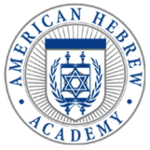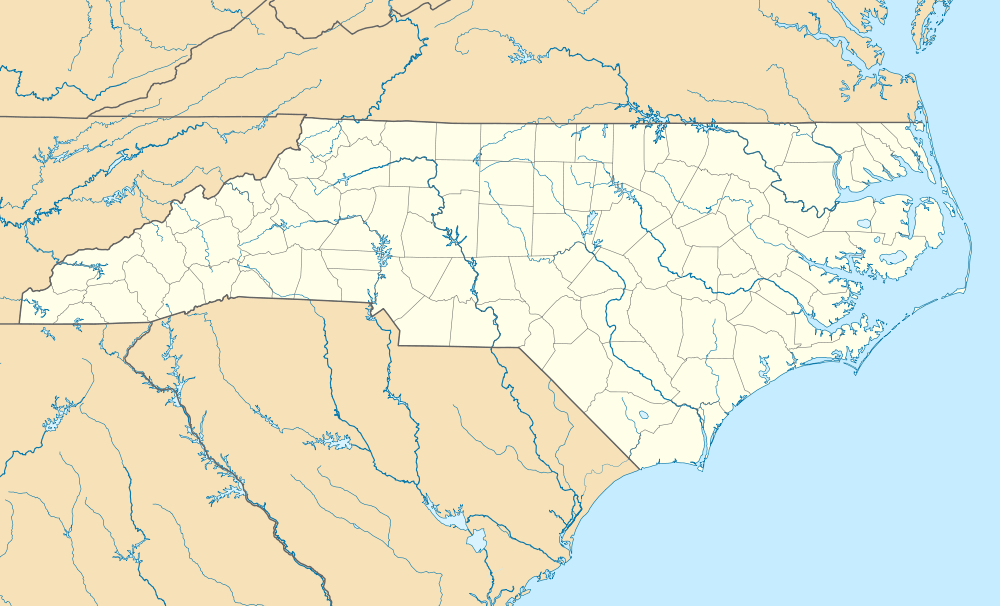American Hebrew Academy
The American Hebrew Academy (AHA) was the only international Jewish college preparatory school in the world for boarding and day students between 9th and 12th grade during its years of operation.[6][7] The coeducational school was located in Greensboro, North Carolina, with a 100-acre (40 ha) campus designed by Aaron Green, protégé of renowned architect Frank Lloyd Wright.[8]
| American Hebrew Academy | |
|---|---|
 | |
| Address | |
 American Hebrew Academy  American Hebrew Academy | |
4334 Hobbs Road , 27410 United States | |
| Coordinates | 36°06′32″N 79°52′15″W |
| Information | |
| Type | Private, boarding |
| Religious affiliation(s) | Jewish |
| Established | 2001 |
| Closed | 2019[1] |
| CEEB code | 341579 |
| Head of school | Abe Tawil[2] |
| Faculty | 51 |
| Grades | 9–12 |
| Enrollment | 145 |
| Average class size | 12 students[3][4] |
| Student to teacher ratio | 4:1 |
| Campus | Gated, 100 acres (0.4 km²) |
| Color(s) | Blue, white, red |
| Athletics | 16 Interscholastic Sports |
| Mascot | Eagle |
| Tuition | $24,000 (day students) $42,000 (boarding students)[5] |
| Website | americanhebrewacademy |
The academy was nationally accredited in the United States by the Southern Association of Independent Schools (SAIS) and the Southern Association of Colleges and Schools (SACS).[9] The academy was also a member in of The Association of Boarding Schools (TABS) and the only Jewish school awarded the Green Ribbon by the U.S. Department of Education.[10]
The academy closed on June 11, 2019, but on September 13, 2019, it was announced that the school will reopen for the 2020–21 school year.[1][11]
History
The academy opened in fall 2001. The school was founded by several leaders in Jewish education, including Alvin Mars, to create a pluralistic learning and leadership environment. The initial objective of the school was simply to create a high school option for the local Jewish community near Greensboro, and to draw a critical mass of students from other regions of the country where Jewish day school was not a feasible option.[12] Subsequent to the school's founding, the school's unique identity as a coed, pluralistic Jewish boarding school attracted students globally and hosted a diverse student body from over 35 countries.
The academy's inception was sponsored and spearheaded by Maurice "Chico" Sabbah, a philanthropist, businessman, Sephardic Jew, and Zionist, and longtime resident of Greensboro. Sabbah's nephew, Glenn Drew, continued to manage the school and served as CEO and General Counsel since the school's beginning.[13]
Board members include Leeor Sabbah, Glenn Drew, Joseph Weilgus, Joel Fleishman of Duke University, investor Michael Steinhardt, Jehuda Reinharz of Brandeis University, Marsha Cohen, Bonnie Lipton, Scott Shay of Signature Bank, Douglas Greene, Abe Tawil and Larry Heyman.[14]
Closing
On June 11, 2019, Glenn Drew notified community members that the school would close after 18 years, citing financial distress.[15] The news was broadly reported as abrupt and unexpected by Academy students, parents, faculty and alumni and local community members.[1][7] Public tax filings in prior years indicate the school spent $18 million in tax year 2017, $13 million more than covered by that year's tuition and donation revenue. 2017's filing shows the largest cash expenses included $2.75 million in annual Interest Expense and $2 million in annual undisclosed Other Expenses. From 2014–2017, filings also indicate total expenses rose in each year while total revenue declined. Over this time period, Glenn Drew (Treasurer, CEO, Secretary), was the only board member listed to receive direct compensation, which was $402,549 in 2014, $900,429 in 2015, $527,186 in 2016 and $538,362 in the tax year 2017. The school concurrently oversaw a large increase in balance sheet liabilities from approximately $1.7 million in 2013 to $20 million in 2017, coinciding with increases in interest expenses.[16]
Academics
Operating on a trimester calendar, the unique curriculum at AHA was based on a 'dual-curriculum' model in which the general studies (Mathematics, Natural Sciences, Social Sciences, Languages, Honors Level, Advanced Placement and Early College) courses were taught together with Jewish Studies which include Jewish Philosophy, History, Zionism, Religion and Culture).[17] The school was dedicated to pluralistic education, which, unlike most Jewish day schools in the United States, means the academy does not specifically affiliate with a particular movement or denomination of Judaism. Rather, students were exposed to the wide range of ideas and teachings with the opportunity to explore her/his interests independently. The school therefore granted admission to students of any and all Jewish backgrounds.[18]
The primary language of instruction was English and students were required to show a substantial progression with Hebrew language prior to graduation.[19]
Due to its large percentage of international students, AHA had an ESOL (English as a second language) department that prepared foreign students for the American university system.[20]
Many faculty members (24%) were also international or from a dual-language background. The faculty included 32% holding doctorate or equivalent degrees and 67% holding master's degrees. The academy was home to 29 National Merit Scholarship Award honorees and 3 Bronfman Fellows.[21]
Campus
The American Hebrew Academy was situated on a 100-acre (40 ha) campus, including a 22-acre (8.9 ha) lake. Following a national architectural competition to design the campus, Frank Lloyd Wright’s associate architect, Aaron Green, was commissioned to create the master plan for the campus and building designs for every building the academy would eventually need for the immediate future and for years to come.
In addition to 16 single-sex dormitory houses and 34 staff resident apartments, the academy had 32 buildings including an 88,000 square feet (8,200 m2), $18 million athletic center and natatorium. The athletic center includes two basketball courts, rock climbing walls, a racquetball court, an exercise gym and an eight-lane pool.[22]
AHA had the largest closed-loop geothermal exchange well field in the United States to heat and cool its campus. In 2016, the academy dedicated the new Charlotte K. Frank Center for Plant Science & Ecology which provides a state of the art research and experimentation facility for advancing the study of hydroponics, aquaculture, soil and water conservation and Israel's leadership in the development of agricultural technology.[23]
All students were issued laptops.[24] Classrooms have SMART Boards, projectors and cameras and microphones. Classroom seating was at a Harkness style table, teardrop-shaped that facilitates the socratic method. The maximum class-size for most classes was 12 students, allowing for one-on-one interaction with peers and instructors.
Athletics
In addition to the 88,000 square foot athletic center and natatorium, the academy has playing fields including: a soccer stadium, baseball fields, softball fields, multiple all-purpose fields, and a rubberized track constructed of recycled materials. As a member of the Triad Athletic Conference, AHA offers baseball, basketball, cross-country, soccer, swimming, track and field, and volleyball. The academy also hosts a number of intramural and club sports including racquetball, tennis, softball, golf, touch football, ultimate frisbee, yoga, aerobic and weight training, kayaking and sailing, karate, and rock climbing.[25]
Since 2010 the grounds of AHA have been host to 6 Points Sports Academy,[26] the first-in-the-nation Jewish sports summer camp, part of the Union for Reform Judaism's family of summer camps. Open to young athletes ages 9 to 17 from all over North America and abroad, 6 Points Sports is a sleep-away camping experience that offers intensive training in the individual's chosen sport as well as cross-conditioning electives.[27]
The academy also served as the host site for the Piedmont Triad Regional Special Olympics[28] for over ten years beginning in 2006.[29]
Student life
As the only international Jewish boarding school in the world, international students represented a meaningful proportion of the AHA student body. Forty-five percent of the students came from 35 countries. The top five countries represented as of September 2017 were the United States, Mexico, Israel, Brazil and Canada. American students come from 26 states across the U.S.[13]
The junior year class studied abroad in Israel for ten weeks each fall trimester. Students live in Hod HaSharon and study at the Alexander Muss High School in Israel. This immersion program enables students to explore their interest in and strengthen their ties to Jewish history, Israel and the Hebrew language.
AHA students wanting to specialize in a particular area such as STEM, pre-med, law, business, technology, and the arts were able to enhance their studies through a formal partnership that AHA enjoys with The University of North Carolina at Greensboro and the North Carolina Joint School of Nanoscience and Nanoengineering as well as early university studies in all offered subject areas at Guilford College.[30]
References
- "Homepage - American Hebrew Academy". www.americanhebrewacademy.org. Retrieved June 11, 2019.
- "American Hebrew Academy: Staff". Retrieved March 14, 2019.
- "About Us - Quick Facts". American Hebrew Academy. Archived from the original on 2013-10-03. Retrieved 2013-09-30.
- "American Hebrew Academy: The Academy at a Glance". www.americanhebrewacademy.org. Archived from the original on 2015-09-26. Retrieved 2015-11-08.
- "Applying". American Hebrew Academy. Archived from the original on October 18, 2013. Retrieved October 17, 2013.
- "The Academy at a Glance - American Hebrew Academy". www.americanhebrewacademy.org. Retrieved 2017-01-11.
- Pink, Aiden; Feldman, Ari. "American Hebrew Academy, Prestigious Jewish Boarding School, Closes Abruptly". The Forward. Retrieved June 13, 2019.
- Slutsky, Carolyn (October 12, 2008). "Room, Board — And 'Jewish Peoplehood'". The Jewish Week. Archived from the original on November 20, 2008. Retrieved February 16, 2010.
- "Partners and Affiliates - American Hebrew Academy". www.americanhebrewacademy.org. Archived from the original on 2017-01-16. Retrieved 2017-01-11.
- "2012 Awards -- U.S. Department of Education Green Ribbon Schools". www2.ed.gov. 2013-04-22. Retrieved 2017-01-11.
- Web Staff (September 13, 2019). "American Hebrew Academy in Greensboro to reopen for 2020–2021 school year after suddenly closing earlier this summer". Fox 8 WHGP. Retrieved October 1, 2019.
- Cone, Edward (2002-09-30). "Who Is Chico Sabbah?". Forbes. Retrieved 2017-01-11.
- "Against The Odds, AHA Nearing 15th Year". Jewish Week. Retrieved 2017-01-11.
- "American Hebrew Academy Inc - "Form 990" for fiscal year ending June 2017". ProPublica. Retrieved 17 June 2019.
- Cohen, Phil (17 June 2019). "What Went Wrong at the American Hebrew Academy?". Tablet. Retrieved 17 June 2019.
- Tax Filings - AMERICAN HEBREW ACADEMY INC https://projects.propublica.org/nonprofits/organizations/561985976. Retrieved 17 June 2019. Missing or empty
|title=(help) - "The Dual Curriculum - Template: New Client Site (Custom)". www.americanhebrewacademy.org. Archived from the original on 2017-01-16. Retrieved 2017-01-11.
- "North Carolina Boarding School Seeks To Bridge Religious Divides". The Forward. Retrieved 2017-01-11.
- "School Profile 2009–2010" (PDF). American Hebrew Academy. Archived from the original (PDF) on July 22, 2011. Retrieved February 4, 2010.
- "ESOL - American Hebrew Academy". www.americanhebrewacademy.org. Archived from the original on 2017-01-13. Retrieved 2017-01-11.
- "American Hebrew Academy announces National Merit Scholarship Semifinalist Olivia Dweck". www.americanhebrewacademy.org. Archived from the original on 2017-01-13. Retrieved 2017-01-11.
- "Athletics - American Hebrew Academy". www.americanhebrewacademy.org. Retrieved 2017-01-11.
- "CIJE Update – Journey to Israel, STEM Down South | Center for Initiatives in Jewish Education". www.thecije.org. Archived from the original on 2017-01-13. Retrieved 2017-01-11.
- Moffett Banks, Margaret (Feb 15, 2004). "Academy: Molding Future Leaders". News & Record.
- "Athletics - American Hebrew Academy". www.americanhebrewacademy.org. Retrieved 2017-01-12.
- "URJ 6 Points Sports Academy - Jewish Sports Camp - Home". 6pointsSports.org. Archived from the original on 2013-07-26. Retrieved 2015-12-17.
- "Home - URJ 6 Points Sports Academy | North America's Premiere Jewish Sports Camps". 6pointssports.org. Retrieved 2017-01-12.
- "Piedmont Triad Regional Special Olympics". Vimeo.com. Retrieved June 13, 2019.
- "Special Olympics North Carolina". SONC. Retrieved June 13, 2019.
- "Partners and Affiliates - American Hebrew Academy". www.americanhebrewacademy.org. Archived from the original on 2017-01-16. Retrieved 2017-01-11.